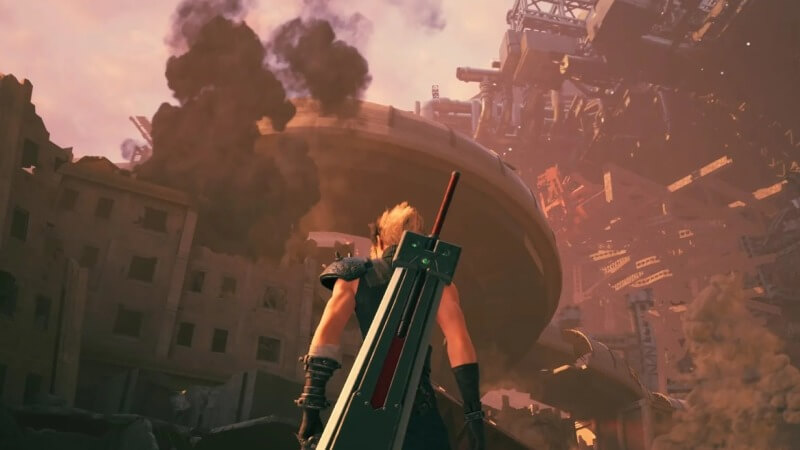Final Fantasy VII Offers a Way of Living and Working through Catastrophe
Fallen Plate Blues: In the midst of senselessness, the iconic RPG embraces both despair and hope

Despair is an uncommon emotion in video games. It’s easy to pontificate about why this might be. Perhaps it is difficult for a medium so often devoted to power and agency to concentrate on powerlessness. Perhaps it is a function of the kinds of fantasies the industry-as-is wants people to focus on. Every one of Final Fantasy XIV’s millions of players is a “warrior of light.” From a hundred Fortnite players is born a single “number one victory royale.” There is an effort in video games writ large to make every player feel like a special consumer. But this is hardly something isolated to video games themselves; we live in a culture devoted to a lack of discomfort, and despair is one uncomfortable feeling. But there can be a sobriety to it. Despair is often framed as unhelpful, but sometimes it is the only logical reaction to the sheer terror of the world. Sometimes there is nothing to do but give ourselves space to feel.
All this makes the plate drop in Final Fantasy VII (and the first part of its remake trilogy) a striking and devastating moment. For the unfamiliar, Final Fantasy VII follows a group of ecoterrorists (and mercenary Cloud Strife) who seek to destroy the megacorporation Shinra and its reliance on mako energy (imagine if oil was the literal blood of the planet). The game opens on a mission to plant a bomb at one of the company’s reactors. The 2020 remake emphasizes that these bombing runs result in the casualties of civilians caught in the explosion. Terrorist group Avalanche’s methods are controversial, both within the organisation itself and in the communities it seeks to liberate. After a second, failed, bombing attempt, Shinra decides to take drastic measures.
Midgar is a quite literal manifestation of class warfare. The upper and middle classes dwell on the “plate,” a metal dish suspended above the ground. These people mostly work for Shinra itself and have easy access to the seemingly infinite supplies of mako from the reactors. Sprawling underneath the plate are Midgar’s slums. Shantytowns and open-air markets bustle with people looking for a quality-of-life that is literally suspended over their heads. Avalanche HQ is located beneath Tifa’s bar in the slums of Sector 7. Shinra decides to drop a section of the plate on Avalanche’s home turf, killing as many people as possible and blaming it all on the terrorists.
In other words, the plate drop is the product of total senselessness. Avalanche emerges intact; every member that dies perishes during the skirmish before the plate falls. The process emboldens Cloud and crew (more on this later) who now have nothing left to lose. It merely kills countless innocents. Neither the original nor the remake focuses on this, but the fall is just as destructive for Midgar’s middle class as its slums. Shinra gains little from this violence, but also doesn’t care about what it loses. The poor are endless and replaceable. The plate drop is even a foreshadowing of the game’s ultimate villain’s plan to drop a meteor on the planet.
In both versions, a set of comedy hijinks precede the revelation of Shinra’s plan. Cloud and Aerith share a moment of intimacy on a playground and then she forces Cloud to wear a dress as part of some harebrained scheme. Upon discovering Shinra’s plan, the game becomes a rush back to sector 7, frantic and desperate. Before the main characters even arrive, several members of Avalanche are already wounded or dead. Remake magnifies this feeling. Cloud arrives just in time to save lives before the game’s ghostly incarnations of fate appear to delay him. In ludic terms Avalanche is victorious. Cloud, Tifa, and Avalanche leader Barrett best Shinra’s top operatives. But all that victory is ripped away from the player in a cutscene. The trio barely escapes, and then the game takes a beat to linger on devastation. The collapse obliterates the very playground which just hours before was the site of profound connection. Now, the heads of plastic cats gape with shrapnel. Standing before the wall of rubble that divides him from Sector 7’s ruin, Barret screams and blasts the wall with machine gun fire, a rage so impotent that the original game’s wide shot swallows it up entirely.